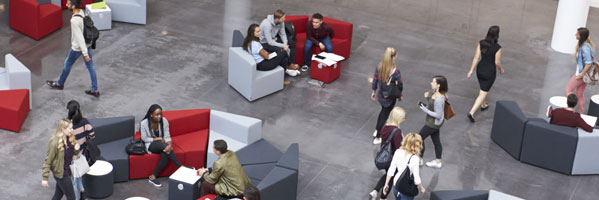20 July 2020
Induction in disruption: becoming a sabbatical officer in 2020

Author
Alexander Hedlund
Current Vice-President Education for Heriot-Watt University Student Union and Enhancement Theme Student Lead
What a whirlwind these last few weeks have been! Nothing like diving headfirst into a new role during a global pandemic to get the blood pumping, right?
Virtually constant meetings
Between the excitement of becoming a sabbatical officer and the stress of actually being one, the sense of purpose cutting through lockdown’s monotony came as a much-needed respite. Nothing can beat the boredom blues of being in lockdown like full days of meetings, trading one mental health antagonist for another. Perhaps it was hubris, but despite the warnings I thought virtual meetings couldn’t be that bad. Oh, how wrong I was. Without the time in between to recover and recoup, virtual meetings leave you shattered. The inability to read body language, the stress of not knowing when to speak for fear of cutting someone off, the instantaneous ability to switch from one committee to the next; it is one of the biggest challenges to working remotely. It is such a wide-felt problem that Heriot-Watt University has instituted a policy to have committees only meet at five past the hour, to give everyone those essential few minutes to breathe and recover. The University has also introduced regular institution-wide rest days every other month, as it is too easy to overwork ourselves and burnout. In addition, the Student Union’s CEO has implemented a new wellbeing policy that, where possible, we are expected to take Friday afternoons off to rest, recoup and, lockdown permitting, visit with friends and family.
Team dynamics without walls
While I know the other sabbatical officers are always there, one of the biggest challenges of the first few weeks in my new role was figuring out how to build a team dynamic without an office. With colleagues all working independently from home, we rarely get the chance to get to know each other. It’s a taste of the difficulty blended learning in a socially distanced environment may present for students. How do we replace the organic social interactions of a lecture? How do we facilitate students’ social growth? Better yet, how far can we really go in our prescriptiveness of community building to students? How much of the onus is on us, as a University and Student Union, to embed some form of social interaction within the curriculum, especially given the critical link between social networks and retention? (If you have the answer, please get in touch union.vpeducation@hw.ac.uk).
Watching my time
It feels like every COVID silver-lining comes with a curse. If you’re like me and you get lost in conversation easily, you will no doubt have been stressing around time management. With few people (or none, in my case) around to distract from work, I can build strong timekeeping habits to keep me going when I transition to office-based working. However, I’m at home, where the urge to sit back and relax is very strong. Fighting procrastination and distractions is a daily struggle and it is so easy to get lost down a rabbit hole of something unrelated because you are in the comfort of your own home. While it is important to maintain discipline, I have also come to appreciate that distractions can sometimes be therapeutic and restorative, too.
Keeping well in sustainable ways
Mental health and wellbeing were recurring themes in my induction and continue to be a focus in committee meetings. Rated as one of the top concerns of students studying amid the pandemic [1], staff and student wellbeing is at the forefront of everyone’s minds. Do not neglect yourself. Do not feel like you need to be in committees all day long, however hard that may be to resist. Learn to say no; I know I am terribly guilty of not doing so. These are all habits I am having to build, and I am sure I am not alone. The more focus we place on good mental health and sustainable remote working practices now, the easier it will be to maintain these habits when the academic year starts.
As challenging as these times are for our emotional and psychological wellbeing, I see leaps and bounds being made to support the wellbeing of diverse communities because of our current circumstances. Can we take this opportunity to establish new norms
and champion self-care? Are we living through more than just a paradigm shift in pedagogy? I certainly hope so.
[1] NUS Scotland, (April 2020). Coronavirus and Students Survey: Scotland Results (Rep.). Glasgow, Scotland: NUS Insight.
